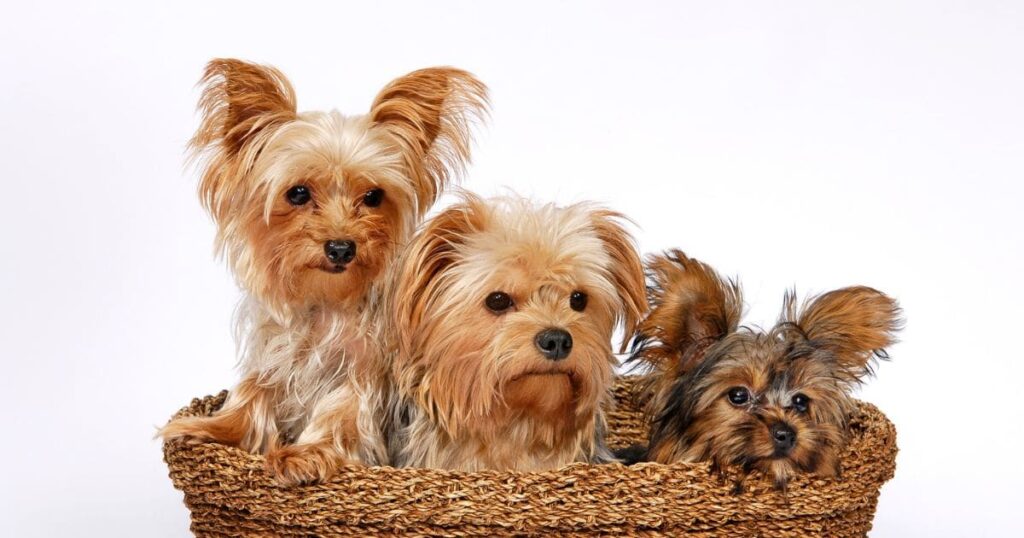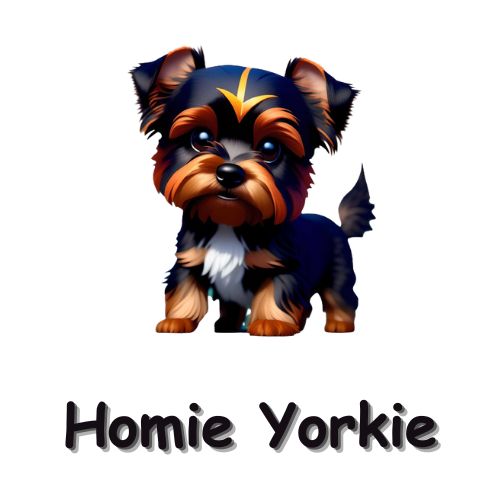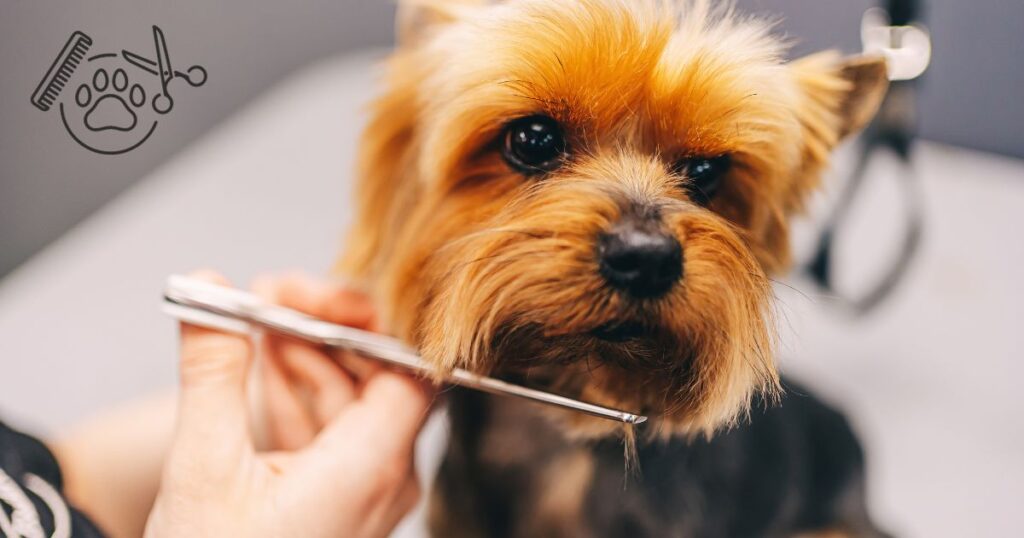When Do Yorkies Stop Growing? [Standard Growth Stages]

Yorkshire Terriers, affectionately known as Yorkies, have won the hearts of dog enthusiasts worldwide with their charming personality and adorable appearance.
As one of the most popular small dog breeds, Yorkies are cherished companions that bring joy and companionship to countless households. As a responsible pet owner, it’s crucial to be well-informed about your furry friend’s growth and development.
Understanding the Growth Stages
From the delightful days of puppyhood to the graceful years of adulthood, Yorkshire Terriers go through various growth stages. Each stage is marked by distinct milestones and physical changes that contribute to their overall development. By comprehending these stages, you can provide the best care and support for your Yorkie throughout its life.
Why Understanding Growth Stages is Important?
Knowing when do Yorkies stop growing is crucial for properly understanding their growth stages. This knowledge allows you to predict their needs, spot potential issues, and ensure they grow into healthy and happy adult dogs.
Different stages call for unique care requirements, and being well-prepared will strengthen the bond between you and your furry companion. Let’s explore each growth stage in detail to learn when Yorkies stop growing and how to support their development effectively.
Yorkies Different Growth Stages
Yorkshire Terriers, like all living beings, undergo specific growth stages as they progress from adorable puppies to mature adults. Understanding these stages is essential for providing optimal care and support throughout their development.
Stage 1 (Puppyhood)
The puppy stage is undoubtedly one of the most endearing phases in a Yorkie’s life. During the puppy period, which typically lasts from birth to around six months, Yorkies experience rapid growth and significant physical changes. They are full of energy and curiosity, exploring the world around them.
key milestones and physical changes
- Opening their eyes and ears, allows them to experience the world through sight and sound.
- Development of baby teeth, which later transition to adult teeth as they grow.
- Learning social behaviors, such as interacting with littermates and understanding pack dynamics.
- Beginning of house training and basic obedience training.
Stage 2 (Adolescence)
The adolescent phase, spanning from around six months to one year, is characterized by a continued growth spurt, though at a slower rate compared to puppyhood. During this stage, Yorkies may exhibit some stubbornness and testing of boundaries.
Key milestones during this stage
- Continued growth in height and weight, although at a more gradual pace than before.
- Development of their adult coat, which starts to replace the soft puppy fur.
- Refinement of social skills and interaction with other dogs and humans.
- Increased independence and a sense of individuality.
Stage 3 (Young Adulthood)
As Yorkies approach the age of one year, they enter young adulthood. This stage lasts until they reach around two years old. The growth rate significantly slows down, and they approach their full-grown size.
Key milestones during young adulthood
- Attainment of their full height and weight, with minor fluctuations in size due to individual differences.
- Consolidation of adult behaviors and temperamental characteristics.
- Final maturation of their coat, revealing its full texture and color pattern.
- Continued learning and training to reinforce positive behaviors.
Stage 4 (Adulthood)
Once Yorkies reach the age of two, they are considered fully grown adults. During this phase, their growth comes to a halt, and they achieve their maximum size and weight.
Key characteristics of Yorkies in adulthood
- A stable height and weight, remaining relatively consistent throughout their adult years.
- A well-defined and mature personality reflects their unique traits and temperament.
- Full development of muscles and body structure, showcasing the grace and elegance of the breed.
- Continued need for proper care, nutrition, exercise, and regular veterinary check-ups.
Growth Chart
| Age (Months) | Average Weight (lbs) | Average Height (inches) |
|---|---|---|
| 2 | 1 – 2 | 4 – 5 |
| 4 | 2 – 3 | 6 – 7 |
| 6 | 3 – 4 | 7 – 8 |
| 8 | 4 – 5 | 8 – 9 |
| 10 | 5 – 6 | 9 – 10 |
| 12 | 6 – 7 | 9 – 10 |
| 18 | 6 – 8 | 9 – 10 |
| 24 | 6 – 8 | 9 – 10 |
As Yorkies’ growth rate can vary slightly based on genetics and other factors, these averages provide a general guideline to help pet owners track their Yorkie’s progress.

When Do Yorkies Stop Growing?
Yorkshire Terrier owners often wonder when their beloved furry companions will reach their full size and stop growing. Understanding the typical age range when Yorkies stop growing is essential for providing appropriate care and ensuring their well-being throughout the development process.
In general, most Yorkies reach their full-grown size between 10 to 12 months of age. Around this time, you can expect your Yorkie to have achieved its maximum height and weight.
However, it’s important to note that individual variations can occur, and some Yorkies may continue to grow slightly beyond this age, though at a much slower rate.
Factors Affecting Growth Rate
Several factors influence the growth rate of Yorkshire Terriers:
- Genetics: The genetic makeup of a Yorkie plays a significant role in determining its size and growth potential. If your Yorkie’s parents were relatively small, there’s a higher likelihood that your pup will also have a small size.
- Nutrition: Proper nutrition is crucial during the growth stages, as it directly impacts a Yorkie’s development. A balanced diet, rich in essential nutrients, supports healthy bone and muscle growth, ensuring your pet reaches its full potential.
- Overall Health: A Yorkie’s overall health and well-being can affect its growth rate. Regular visits to the veterinarian, timely vaccinations, and preventive care contribute to a healthy and steady growth process.
By considering factors like genetics, nutrition, and overall health, you can ensure your beloved Yorkie grows into a healthy and happy adult dog.
While most Yorkies stop growing around 1 year of age, individual variations can lead to different growth patterns. Some Yorkies may experience a slower growth rate, extending their development timeline.
On the other hand, others may undergo growth, achieving their full size earlier than expected. As a pet owner, it’s essential to monitor your Yorkie’s growth and consult your veterinarian if you have any concerns.
How Fully Grown Yorkies Look Like?
As your adorable Yorkshire Terrier makes its way through the various growth stages, you might find yourself wondering when it has reached full size and maturity.
Recognizing the signs that indicate a Yorkie has attained its maximum growth is essential for providing appropriate care and ensuring its well-being.
Physical Signs of Full Size and Maturity
When a Yorkie is fully grown, several physical signs become evident:
- Steady Height and Weight: A fully grown Yorkie’s height and weight will stabilize, remaining relatively constant for an extended period. You’ll notice that your pet’s growth has ceased, and it has reached its adult size.
- Mature Coat: The puppy fluff will have transitioned into an adult coat. Yorkies have a beautiful and silky double coat, and at full maturity, it will have fully developed.
- Proportional Body: A mature Yorkie will exhibit a well-proportioned body, with its head, body, and tail in balance. The body will have developed a graceful and elegant appearance, characteristic of the breed.
Determining Optimal Weight and Height
To determine if your Yorkie is at its optimal weight and height for its age, consider the following:
- Breed Standards: Familiarize yourself with the breed standards set by recognized kennel clubs, such as the American Kennel Club (AKC) or the Yorkshire Terrier Club of America (YTCA). These standards define the ideal height and weight for adult Yorkies.
- Veterinary Guidance: Consult your veterinarian during regular check-ups. They can assess your Yorkie’s growth progress, comparing it with the breed’s average development, and advise you if any adjustments are needed.
- Healthy Body Condition: Evaluate your Yorkie’s body condition by feeling its ribs and observing its waistline. A fully grown Yorkie should have a waist that is visible but not excessively pronounced, and its ribs should be easily felt without being too prominent.
Visualizing Fully Grown Yorkies



Seeing images of fully grown Yorkies can give you a clear idea of their appearance and physical development as they mature into delightful companions.
What Factors Influence Yorkie Growth?
Yorkshire Terrier’s growth is influenced by various factors that collectively contribute to their size and development. Understanding these factors is essential for ensuring your beloved Yorkie reaches its full growth potential and remains healthy throughout its life.
Genetics
Genetics plays a fundamental role in determining a Yorkie’s size and growth potential. A Yorkie’s genetic makeup is inherited from its parents, and certain traits, including size, are passed down through generations. If the parents are small in size, it is likely that their offspring, too, will be petite.
Diet and Nutrition
Yorkies, known for their small size and big personalities, can sometimes be selective about their food. Proper nutrition is vital for a Yorkie’s healthy growth. A balanced diet that meets their specific nutritional needs supports bone development, muscle growth, and overall well-being.
Ensure that your Yorkie’s diet includes high-quality protein, essential vitamins, minerals, and fats. Consult your veterinarian for advice on the best diet plan for your Yorkie’s individual needs.
Physical Exercise
While Yorkies are small in size, regular exercise and physical activity are essential for their growth and overall health. Exercise helps develop strong muscles, maintains healthy bone density, and prevents obesity.
Engage your Yorkie in daily playtime, short walks, or interactive activities to keep them active and stimulated.

Proper rest and sleep are essential for a Yorkie’s growth and well-being. During sleep, the body repairs and regenerates tissues, contributing to healthy development. Provide a cozy and comfortable sleeping area for your Yorkie to ensure they get enough rest.
Environment
The environment in which a Yorkie is raised can also influence its growth. Providing a safe, clean, and enriching living space supports their overall well-being and development.
Avoid Overfeeding and Obesity
Overfeeding can lead to excessive weight gain and obesity in Yorkies, which can negatively impact their growth and health.
Obesity puts strain on their joints and bones, potentially leading to developmental issues. Follow feeding guidelines and monitor your Yorkie’s weight to maintain a healthy body condition.
How to Support Healthy Growth of Yorkie?
Ensuring the healthy growth and development of your Yorkshire Terrier is essential for their overall well-being and happiness. Here are some practical tips to support your Yorkie’s growth journey and provide them with the best care possible:
Follow Feeding Guidelines
Follow a balanced and age-appropriate diet for your Yorkie. Choose high-quality dog food specially formulated for small breeds and ensure it meets their nutritional needs. Consult your veterinarian to determine the right portion size and feeding frequency based on your Yorkie’s age, weight, and activity level.
1. Nutritious Treats: While treats can be a great way to reward your Yorkie during training, choose healthy and low-calorie options. Avoid excessive feeding of high-calorie treats as this can lead to weight gain and affect their growth negatively.
2. Controlled Growth: Avoid overfeeding or rapid weight gain, as it can put stress on their developing bones and joints. Controlled growth is vital for preventing skeletal issues, especially during puppy stages.
Establish Daily Exercise Routine
Provide daily opportunities for exercise and playtime. Engage your Yorkie in activities that match their energy level and physical abilities. Short walks, interactive play, and mental stimulation games are excellent choices.
1. Safe Environment: Create a safe and secure environment for your Yorkie to explore. Remove any hazards or objects that could potentially harm them during their curious explorations.
2. Socialization: Introduce your Yorkie to various experiences, people, and other pets from an early age. Proper socialization enhances emotional development and helps them become well-adjusted adults.
Establish Grooming Routine
Establish a regular grooming routine to keep your Yorkie’s coat clean and healthy. Regular brushing helps distribute natural oils, prevents mats, and allows you to check for any skin issues or abnormalities.

Monitor Growth Progress
Keep track of your Yorkie’s growth progress by recording their weight and height regularly. This allows you to ensure they are developing at a steady rate and identify any unexpected changes that may require veterinary attention.
Regular veterinary check-ups are crucial for monitoring your Yorkie’s growth progress and overall health. Your veterinarian can assess their development, offer guidance on nutrition and exercise, and address any concerns that may arise.
Beyond regular check-ups, be attentive to any changes in your Yorkie’s behavior, appetite, or physical appearance. If you notice anything unusual or concerning, seek immediate veterinary attention.
Common Growth-related Concerns and Solutions
Throughout your Yorkshire Terrier’s growth journey, you may encounter various concerns that are perfectly normal and can be addressed with proper care and attention. Here are some common growth-related concerns and their solutions to ensure your Yorkie’s healthy development:
Delayed Growth
Some Yorkies may experience a slower growth rate compared to others. If you notice that your pup is not growing as rapidly as expected, there’s no need to worry immediately.
Keep in mind that individual variations exist, and some Yorkies may take a little longer to reach their full size. To address delayed growth:
- Continue providing a nutritious and balanced diet to support their development.
- Consult your veterinarian to ensure there are no underlying health issues affecting their growth.
- Monitor their weight and height regularly to track their progress.
Sudden Growth Spurts
On the other hand, some Yorkies may undergo sudden growth spurts, where they seem to be growing rapidly over a short period.
While growth spurts are a normal part of development, they may cause temporary imbalances in your Yorkie’s body. To manage sudden growth spurts:
- Adjust their diet as per your veterinarian’s recommendation to adjust their increased nutritional needs.
- Provide opportunities for exercise and play to support their muscle and bone development.
- Avoid overexertion, especially during growth spurts, to prevent strain on their joints.

Weight Management
Maintaining a healthy weight is essential for your Yorkie’s overall well-being. Obesity can lead to various health issues, affecting their growth and quality of life. To manage weight effectively:
- Follow feeding guidelines provided by your veterinarian to ensure you’re feeding the right amount of food.
- Limit treats and high-calorie snacks to prevent unnecessary weight gain.
- Engage in regular exercise to help your Yorkie burn calories and stay fit.
Testimonial

I noticed that my Yorkie, Bella, was growing at a slower rate compared to her littermates. After consulting our veterinarian, we learned that it was perfectly normal due to her genetic makeup. We continued to provide her with a balanced diet and monitored her growth regularly. Sure enough, Bella caught up and is now a healthy and happy adult Yorkie!
— Mary Francis
What the Veterinarian said?
Yorkies are known for their unique growth patterns, and it’s common to see variations among individuals. As long as their growth remains steady and they are in good health, there’s generally no cause for concern. Regular check-ups are essential for monitoring their development and addressing any issues promptly. Robert performs a fantastic job by taking his pet to the veterinarian.
Our Thoughts
Understanding the growth and development stages of Yorkshire Terriers is vital for every pet owner.
Encouraging responsible pet ownership is crucial for providing the best care for your growing Yorkie. They rely on you for their well-being, so be attentive to their needs, monitor their growth, and seek veterinary advice when necessary.
We invite readers to share their experiences and ask any questions they may have in the comments section below. Sharing knowledge and experiences can help other Yorkie owners in their journey of raising happy and healthy companions.
Remember, with proper care, attention, and love, your Yorkshire Terrier will flourish into a delightful and devoted lifelong companion.



